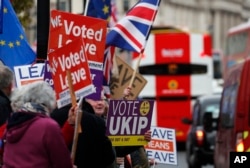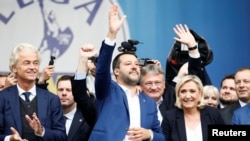The return of Britain’s Mr. Brexit, the breezy, barnstorming Nigel Farage, to frontline politics epitomizes the challenge established centrist parties are facing across the 28-member European Union as they struggle to curtail fiery populism in the final days of campaigning in EU parliamentary elections.
In an era when social media is driving politics and traditional political allegiances are waning, the populist agenda of nationalist pride and cultural grievance is trumping the much more bland and less adventurous managerial problem-solving of the establishment parties.
Farage can rightly claim to be the man behind Brexit. It was his agitation that prompted then Prime Minister David Cameron to call a referendum on whether Britain should remain in the EU, hoping to take the sting out of the electoral tail of Farage’s UK Independence Party.
On the campaign trail, Farage, a former city-slicker who was educated at a top private boarding school, presents himself as a man of the people. He offers nothing in the way of detailed policies, saying he’ll do so after the European parliamentary elections on May 22.
His newly formed Brexit Party hasn’t even offered a written manifesto.
Farage's message
His message, on campaign stops and TV studios, is simple: the British people have been betrayed by a conniving, greedy political elite which has failed to deliver on the Brexit vote.
Like Italy’s Five Star Movement, Farage is seeking to transcend the traditional left-right divide, after dumping his former far-right party, the UK Independence Party.
And the simple betrayal narrative is fueling his new party's lead in the polls before this week’s European Parliament elections, helped by the pro-EU vote split between several parties.
The opinion polls forecast the Brexit Party will top the election in Britain with 34 percent of the vote.
The ruling Conservative Party is predicted to secure just nine percent of the vote, placing fifth. If accurate it would be the storied party’s worst electoral performance.
Farage is focusing now more on the Labour Party’s working-class, post-industrial heartlands of the north of England and south Wales, where globalization has brought few obvious benefits, although the rust-belt manufacturing and mining towns that powered Britain’s industrial rise in the 19th century have scooped up plenty of EU development funds — a point Farage glosses over when challenged by reporters.
Many traditional Labour voters thrill to Farage’s message of the people versus the elite. “I’ve come to realize that with our existing political system we are never going to get the Brexit that we voted for,” he told a crowd Saturday in the town of Merthyr Tydfil, a Welsh town that was home to one of the founders of the Labour Party.
“They are trying to build a coalition of the politicians against the people,” Farage said.
Impact on continent
A similar message of betrayal can be heard across the European continent, although in the other 27 EU states Brexit isn’t a factor and neither is following Britain to the exits. Britain’s Brexit mess appears to have put off even euroskeptic Europeans from contemplating departures.
Last September a survey across the bloc found 62 percent of respondents saying EU membership was a good thing.
Even so, populists, whether running national governments or not, are finding an electoral message of grievance playing well for them, whether it be a full-throated targeting of those perceived as being the elite or calls for the protection of ordinary people from the disruption of globalization or impact from migration.
Italy’s Deputy Prime Minister Matteo Salvini leads the far-right Lega party, he has been only partly successful in persuading Europe’s nationalist populists to run coordinated campaigns, but also has a simple electoral message.
Salvini calls for tougher borders and the protection of European culture and for a looser EU where Brussels and EU institutions are subordinated to national governments.
Saturday nearly 100,000 supporters attended a Salvini rally in Milan with European nationalists, including France's Marine Le Pen, and Holland's Geert Wilders. leader of the Dutch party PW (Party of Freedom).
“The political elites in Brussels cannot be trusted. They want to impose their orders on us. They want to take away our identity and our security,” Wilders said at the rally.
European populists
A fourth of Europeans consider themselves populists, according to a recent poll. Pollsters predict they will capture a third of the seats in the 721-seat EU Parliament.
“Certain far-right populist parties—notably those in western and northern Europe—have proved able to tailor their message to extend support beyond their secure voting base,” according to Daphne Halikiopoulou, a politics professor at Britain’s University of Reading.
“Far-right populists normalize exclusion: they offer solutions to voters’ multiple insecurities by using a rhetoric that excludes a variety of population groups on the basis that they are a purported threat to society’s value consensus, and hence to stability and prosperity,” she argued recently.
But analysts also say the populist parties have significant ideological divisions, including migration and relations with Russia. Their biggest challenge may come after the elections when they might find unity difficult to achieve.









